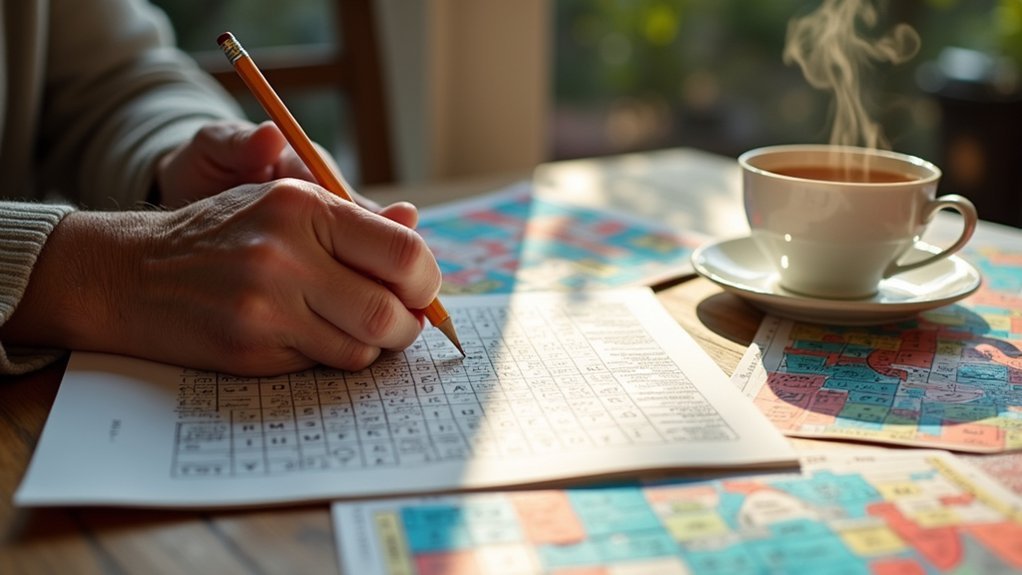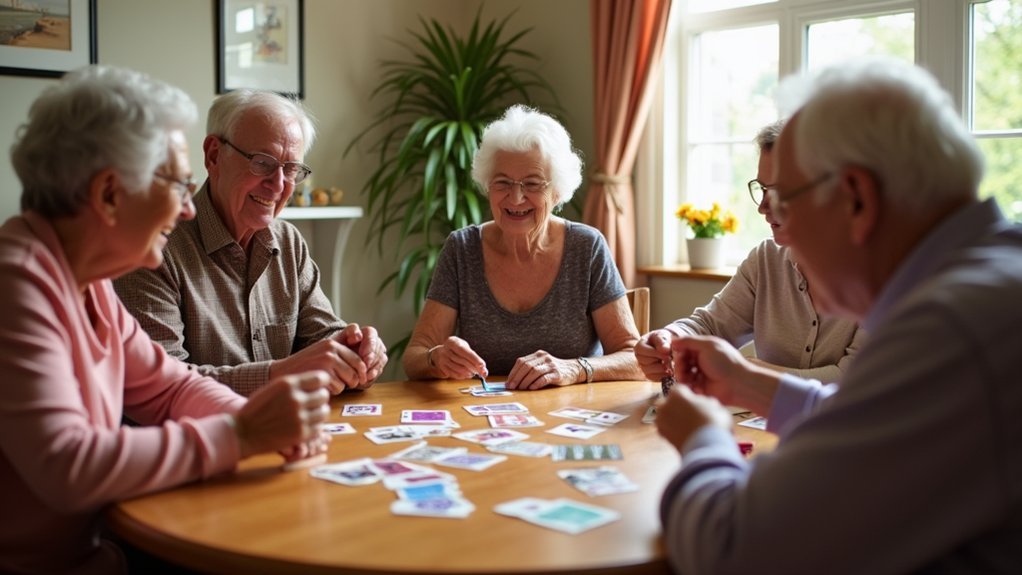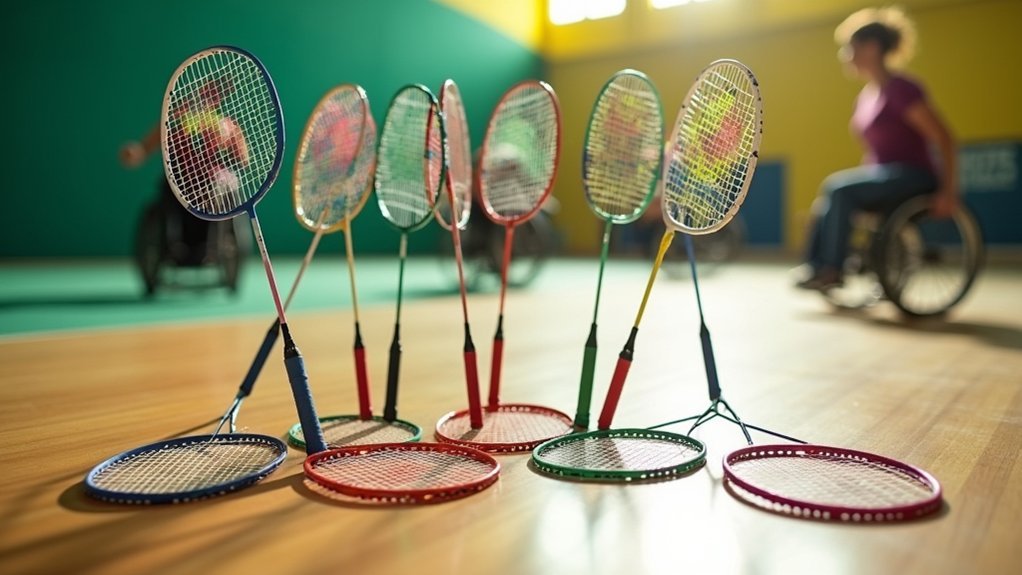You can stimulate cognitive function in Alzheimer’s patients with simple memory games, word puzzles, and jigsaw puzzles that encourage neural pathway development. Physical activity breaks improve both brain and body health. Social card games, Mahjong, and dice games enhance strategic thinking while fostering important social connections. Creative expression activities allow for self-expression and emotional release. These structured activities not only boost memory but can slow cognitive decline when used consistently.
7 Second-Level Headings

When creating memory-boosting activities for Alzheimer’s patients, well-organized second-level headings provide vital structure to your program.
These headings help you categorize activities into manageable sections that target different cognitive areas while maintaining a consistent routine.
Structuring activities into focused segments allows for targeted cognitive work while providing the comfort of predictable patterns.
Consider organizing your program under headings like “Morning Memory Games,” “Physical Activity Break,” “Creative Expression Time,” and “Social Interaction Hour.”
This structure helps caregivers implement a balanced approach that includes cognitive stimulation, physical exercise, and social engagement—all significant elements for Alzheimer’s care.
Each heading should reflect activities tailored to the individual’s abilities and interests.
For instance, under “Creative Expression Time,” you might include art therapy for one patient but music therapy for another, depending on their personal history and preferences.
With nearly 12 million Americans providing unpaid care for someone with dementia, creating clear, organized activity structures can significantly reduce caregiver stress while improving patient outcomes.
Chunking Memory Games: Simplifying Information for Better Recall
Although many cognitive functions decline with Alzheimer’s progression, chunking techniques remain remarkably effective, especially during early stages of the disease. By grouping information into meaningful units, you’ll help your loved one reduce cognitive load and enhance recall.
Focus primarily on verbal chunking activities since this ability stays preserved longer than spatial memory chunking. Try breaking phone numbers into smaller parts (555-123-4567), or organize grocery lists by categories (dairy, produce, meats). Present information in structured patterns rather than random sequences.
Daily practice with verbal chunking exercises can maintain working memory function longer. According to research from King’s College London, structured trials showed significantly better performance than random sequences in verbal working memory tasks. Incorporate these techniques during conversations by organizing information into digestible chunks.
While chunking won’t transfer to all cognitive domains, it provides meaningful improvements in verbal memory that can enhance daily functioning.
Word Puzzles and Crosswords for Neural Pathway Building

Word puzzles and crosswords represent another powerful memory-boosting approach for Alzheimer’s patients. Research shows they outperform computer games in enhancing cognitive function, particularly at later stages of cognitive impairment.
They’ve been linked to reduced brain atrophy and improved daily functioning after long-term engagement. A recent study published in NEJM Evidence demonstrated that crossword puzzles led to less brain shrinkage compared to digital brain games in participants with mild cognitive impairment.
For best results with crossword puzzles:
- Choose medium-difficulty puzzles – similar to Thursday New York Times crosswords – for effective cognitive stimulation
- Implement structured training with intensive initial sessions followed by regular boosters
- Maintain long-term engagement – benefits become more pronounced over extended periods (up to 78 weeks)
Consider incorporating crosswords into a broader cognitive training regimen for maximum effectiveness, as they complement other memory-enhancing activities while building neural pathways.
Jigsaw Puzzles: Visual Processing and Spatial Reasoning Exercise
Jigsaw puzzles offer a thorough cognitive workout for Alzheimer’s patients, engaging multiple brain regions simultaneously. When your loved one works on these puzzles, they’re exercising visuospatial cognition and promoting neuroplasticity through visual processing challenges.
These activities stimulate dopamine release, enhancing mood while shifting the brain to a meditative, calming state. For dementia patients, puzzles can delay symptom progression by 6-9 months and improve quality of life through enhanced communication opportunities. While research shows that mentally stimulating activities may delay symptoms but not prevent dementia entirely, they remain valuable therapeutic tools.
Engaging with puzzles naturally boosts mood while creating a peaceful mental state that can significantly delay cognitive decline.
Choose puzzles appropriate for your loved one’s cognitive abilities—larger pieces for advanced impairment and more complex designs for milder cases.
The benefits extend beyond cognitive stimulation; jigsaw puzzles also reduce stress and anxiety while promoting a sense of accomplishment. Incorporating these accessible activities into daily routines provides both therapeutic value and meaningful engagement.
Social Card Games That Enhance Strategic Thinking

Social card games represent another powerful tool in the memory enhancement arsenal for Alzheimer’s patients. They combine cognitive stimulation with valuable social interaction, creating an engaging environment that can potentially delay cognitive decline while reducing feelings of isolation.
For maximum benefit, consider these strategic card games:
- Bridge – Requires planning, memory, and partner communication, exercising multiple cognitive functions simultaneously.
- Rummy – Helps with pattern recognition and sequencing abilities, which often remain accessible even as dementia progresses.
- Simplified Poker – Encourages decision-making and probability assessment in a familiar, low-pressure format.
Card games like these are particularly effective at improving reasoning and concentration skills, which are cognitive domains commonly affected by dementia. You’ll find these games particularly effective because they’re accessible, engaging, and don’t require complex technology—making them perfect for regular cognitive exercise sessions.
Mahjong: a Traditional Game With Modern Cognitive Benefits
Originating in China centuries ago, Mahjong has emerged as a surprisingly powerful cognitive intervention for Alzheimer’s patients today. Research shows that just 12 weeks of regular play considerably improves executive function, memory, and problem-solving skills in those with mild cognitive impairment.
You’ll find Mahjong particularly valuable because it engages multiple cognitive domains simultaneously. The game’s pattern recognition, strategic thinking, and social interaction create a perfect cognitive workout. Studies reveal that daily players have a 37% lower risk of developing dementia over a 10-year period. The game’s beautifully crafted tiles make it visually stimulating, which can help maintain attention and engagement for Alzheimer’s patients.
For your loved one with Alzheimer’s, Mahjong offers practical advantages: it’s low-cost, physically undemanding, and culturally familiar to many seniors. The game’s structure provides mental stimulation while fostering social connections that combat depression and isolation.
Dice Games for Math Skills and Social Interaction

While many people focus on physical exercise for health, dice games offer an exceptional cognitive workout for Alzheimer’s patients. These simple tools enhance memory, strategic thinking, and mathematical abilities while creating valuable social connections.
Try implementing these dice activities with your loved one:
- Number Addition Games – Use two dice and practice adding the values, helping maintain basic arithmetic skills and number recognition.
- Yahtzee or Simplified Versions – Encourage probability assessment and decision-making while tallying scores in a social setting.
- Pattern Matching Games – Create games where specific dice combinations earn points, promoting memory retention and logical reasoning.
The beauty of dice games lies in their adaptability—you can easily modify rules to match cognitive abilities while providing the social engagement that helps reduce isolation and depression. Research shows that participation in games like Yahtzee may help improve working memory and executive function in older adults experiencing cognitive decline.
Frequently Asked Questions
At What Stage of Alzheimer’s Are These Activities Most Effective?
These activities are most effective in early to moderate stages of Alzheimer’s. You’ll see the best results when your loved one can still participate actively while their cognitive abilities remain relatively preserved.
How Often Should Cognitive Games Be Played for Optimal Benefits?
You should engage in cognitive games 3-5 times weekly for ideal benefits. Aim for 30-minute sessions, increasing complexity gradually. Consistency matters more than duration, so establish a regular routine you’ll stick with.
Can Digital Versions of These Games Provide Similar Cognitive Benefits?
Digital versions can provide cognitive benefits, but research shows traditional activities like crossword puzzles may outperform them, especially in later disease stages. You’ll get the most benefit by combining both digital and traditional approaches.
Do These Activities Slow Disease Progression or Just Improve Symptoms?
These activities primarily help manage symptoms rather than slowing the disease itself. You’ll see improvements in specific cognitive functions and quality of life, but they don’t markedly alter the underlying neurodegenerative progression of Alzheimer’s.
How Can Caregivers Modify Activities for Declining Cognitive Abilities?
You can modify activities by simplifying tasks, using shorter sessions, incorporating visual aids, and tailoring to personal interests. Remember to provide emotional support, repeat familiar activities, and adapt as cognitive abilities change.
In Summary
You’ll find these seven activities offer more than just entertainment for Alzheimer’s patients—they provide meaningful cognitive stimulation. By incorporating these games into daily routines, you’re helping strengthen memory, enhance social connections, and potentially slow cognitive decline. Remember, it’s not about perfection but participation. Start small, celebrate successes, and you’ll create moments of joy while supporting brain health through engaging, purposeful play.





Leave a Reply